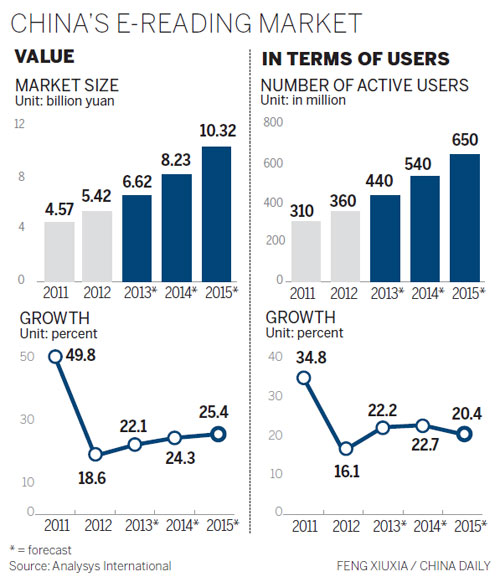
Amazon.com Inc will start selling its e-book readers in China next month as the online retailer seeks to cash in on the digital content it offers in the world's second-largest economy.
The move follows the earlier launch of the company's Android-oriented app store in China, and means it has leapt the final hurdle as it seeks to sell its hardware in the country.
Suning Commerce Group Co Ltd, the country's top retailer of home appliances by market value, has signed an exclusive partnership with Amazon to roll out the Kindle e-book readers and the Kindle Fire tablet, said Ge Shuang, Suning's public relations manager.
The products will be available to Chinese customers in early June, another source at Suning told China Daily on Wednesday.
Apart from Amazon's website, the Kindle will be available to customers via Suning's e-commerce platform as well as its bricks-and-mortar outlets, said the source, who declined to be named.
Suning's e-commerce portal will serve as an alternative for online purchases of the Kindle, enabling nationwide delivery. In addition, special booths will be set up in several Suning outlets to promote the devices.
"Drawing from our prior experience with Microsoft Corp's Surface tablet, we'll basically start with the booths in our flagship stores across China's first- and second-tier cities and gradually expand to other outlets nationwide," said the source.
He did not disclose the pricing structure for the gadgets, and calls to Amazon China's public relations officer went unanswered on Wednesday.
In the United States, the latest version of the Kindle, known as the Paperwhite, sells from $119 to $179, and the 9.7-inch-screen Kindle DX is priced at $299.
Amazon has laid solid ground for the entry of the devices in the Chinese market. Last year, four Kindle models received approval from the State Radio Regulation of China, the regulatory body for radio and wireless products. It also opened a Kindle store in December that sells Chinese e-books.
Everything is now in place for Amazon's hardware to hit the Chinese market, after it unveiled some weeks ago its Cloud Drive storage service and an Android application store that offers paid apps.
The strategy in China is in line with an ambitious plan disclosed in April. At the time, Amazon pledged to take its app store services into nearly 200 new markets.
China's e-book market is expected to reach 8.23 billion yuan ($1.34 billion) in 2014, up 52 percent from 5.42 billion yuan in 2012, according to an estimate from Analysys International, a Beijing-based IT consultancy.
Sun Peilin, senior analyst at the consultancy, said he believes that Amazon's app store should boost revenues for developers by placing a stronger emphasis on paying for digital content.
"The Amazon app store is featured as the main store on Amazon's Kindle tablets, even though it supports any Android device," Sun said.
He said that Amazon promised to offer Chinese users some locally made and overseas gaming titles on the store, but that it will be hard to make any profits because of the fierce domestic competition and the rampant use of pirate apps.
"I think that the Kindle products will pave the way for future marketing in China for Amazon," he said, suggesting that the company should consider cooperating with Chinese Internet companies.
The Chinese e-book readers' market is largely dominated by Shanda Interactive Entertainment Ltd's Bambook and Hanvon Technology Co Ltd's gadgets. But the market was dealt a heavy blow in the past two years by the emergence of devices such as the iPad.
Wang Juelin, 30, a Chinese game developer in California, said that about 80 percent of his colleagues have iPads even though the Kindle has long been available in the United States.
"The iPad is a better option if you happen to use an iPhone, as they work in a similar way. Besides, telecom carriers such as AT&T offer rebates if we buy iPads," he said.
Li Woke in Beijing and Jiang Yinan in Shanghai contributed to this story.
